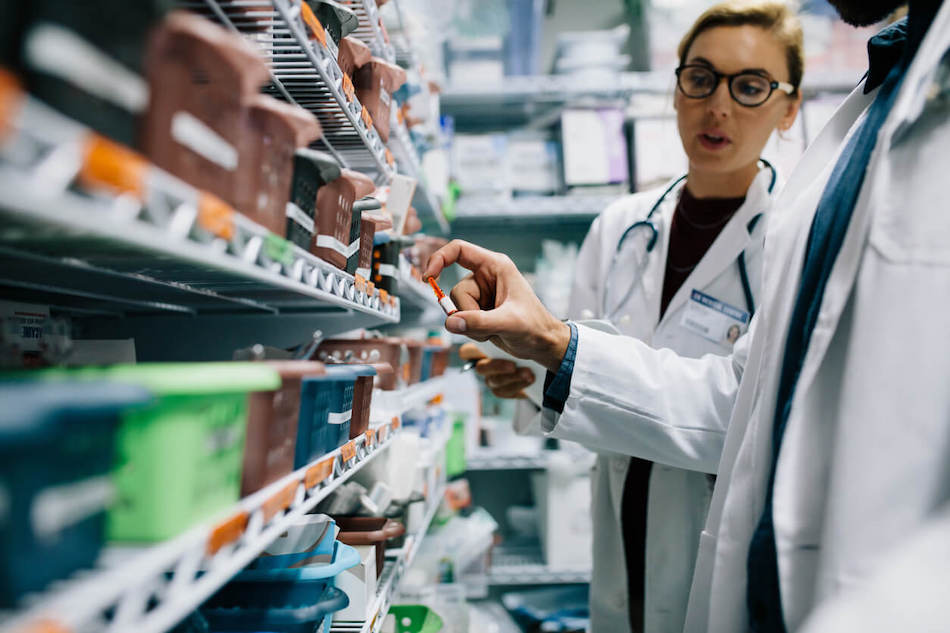Are you considering earning your Doctor of Pharmacy degree (PharmD)? If so, you most likely know that doing so is an integral, non-negotiable step toward becoming a pharmacist.
That being said, it’s only natural to wonder what a PharmD degree might prepare you for. According to Jenny Van Amburgh, assistant dean of academic affairs in the Northeastern School of Pharmacy: A lot.
“Most of the job titles an individual will be qualified for after earning their PharmD degree will have the word ‘pharmacist’ in it, but the fact remains that it’s an incredibly varied field,” she says. “There are more than 100 different career paths that someone might choose to go down once they earn their PharmD. Some of these can be pursued right out of the gate, while others will require additional training.”
Below, we take a closer look at some common career paths that a PharmD will prepare you for, including both traditional and non-traditional roles.
Traditional Career Pathways for Pharmacists
Below is a look at “traditional” or expected pathways that many PharmD graduates pursue. These are the roles people tend to imagine when they think of the word “pharmacist.”
1. Community Pharmacist
Community pharmacists are the individuals who work in retail pharmacies and are the primary image of a “pharmacist” that many laypeople have in mind. Community pharmacists prepare and dispense prescriptions as directed by the customer’s physician. They may also advise individuals about their illness, medications, over-the-counter medications, and general health.
2. Clinical Pharmacist
Clinical pharmacists are typically employed in healthcare settings such as hospitals, clinics, emergency departments, community health centers, or rehabilitation centers. There, they work collaboratively with a healthcare provider or team of healthcare providers to support and treat patients. Clinical pharmacists are heavily engaged in patient care and often make direct clinical interventions for a patient. These interventions can include prescribing medications, stopping medications, ordering labs to evaluate treatments, and more.
3. Institutional Pharmacist
Institutional pharmacists are similar to clinical pharmacists in that they both work in healthcare institutions, such as hospitals. The key difference is that clinical pharmacists are directly involved with patient treatment, while institutional pharmacists are not. Instead, institutional pharmacists perform tasks such as verifying prescriptions, ensuring medication is safe and effective for a patient, preventing negative drug interactions, approving prescriptions, and more. They may even be involved in directly creating medications, such as intravenous solutions, as needed.
4. Consultant Pharmacists
Consultant pharmacists provide consulting services to various partners, depending on their specialty. These partners can include hospitals, clinics, healthcare centers, insurance providers, or pharmaceutical companies. The end goal is typically to improve the partner’s workflows and services.
5. Pharmaceutical Industry Pharmacists
Individuals trained in pharmacy can move on to many different roles directly within the pharmaceutical industry. These professionals are typically referred to as pharmaceutical industry pharmacists. Precisely what a pharmaceutical industry pharmacist does will vary; however, each leverages their pharmaceutical science expertise for business purposes. In this role, they may help design clinical drug trials, establish safety regulations, participate in quality control, or work in sales and marketing.
Non-Traditional Career Pathways for Pharmacists
Aside from the traditional roles described above, there are many alternative pathways that a PharmD graduate can pursue. Some of those pathways include:
6. Veterinary Pharmacists
Veterinary pharmacists perform many of the same duties as clinical and community pharmacists who tend to people—except they treat animals rather than humans. Veterinary pharmacists prepare and dispense medications, advise an animal’s owners on how to use or administer said treatments, and generally work to improve the health of their patients.
7. Geriatric Pharmacists
Geriatric pharmacists specialize in working with older patient populations. They typically treat patients who are at least 65 years old and, as such, tend to be at greater risk for illnesses and medical conditions. Additionally, older individuals are more likely to take multiple prescriptions, which increases the risk of drug-to-drug interactions. Geriatric pharmacists leverage their expertise to mitigate these risks. Many other population-based specialties also exist.
8. Infusion and Compounding Pharmacists
Sometimes, a particular medication is needed but not readily available. In these instances, a physician may order a drug from an infusion or compounding pharmacist who is responsible for creating the medication. For example, if a child needs a medication typically only available in adult doses, or if a medication is only available in tablet form and must be made into a liquid solution, these pharmacists will work to meet the patient’s needs. In the case of infusion pharmacists, the pharmacist may even be responsible for administering the medication.
9. Public Health
Some pharmacists choose to enter the public health field, wherein they can perform a variety of roles. For example, they might be involved in public health projects around pandemic readiness or directly involved in projects such as vaccine drives in at-risk communities. They might also advise local, state, and federal public health authorities and policymakers, amongst many other roles.
10. Legal Pathways
Some pharmacists decide to pursue legal training. Typically, they specialize in pharmaceutical law and regulations, which allows them to advise doctors, hospitals, pharmaceutical companies, and other institutions on legal issues that may threaten their business.
One Degree, Many Career Options
Earning your PharmD can prepare you for a multitude of careers, each of which will empower you to affect real and lasting change for others. Notably, the above list is by no means exhaustive—there are dozens of other pharmaceutical careers you can decide to pursue after earning your degree.
Learn more about earning your PharmD at Northeastern University.






Related Articles
PhD vs. Master’s in Biomedical Science: What’s the Difference?
10 Top Careers in Biomedical Science
What is Medicinal Chemistry?